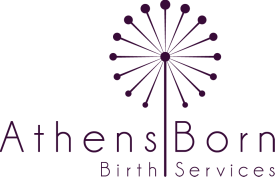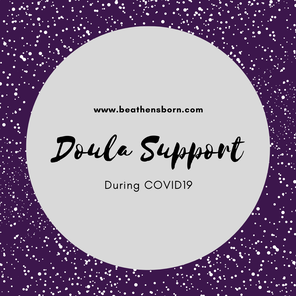When I became pregnant with my first child in 2015, I was thrilled, but also overwhelmed and sort of lonely. I was the first person in my immediate family or my group of close friends to have a baby, and it was isolating to not have anyone to talk to who really understood what pregnancy was like. I wasn’t plugged into the parenting community in Athens yet either, and I didn’t know where to go or who to ask (or what to ask) to find resources for pregnancy and parenting. I also didn’t know about doulas! My first pregnancy was hard, and my daughter’s birth was not at all what I had envisioned it to be. It wasn’t until 2.5 years later, when I was pregnant with my second child, that I discovered the existence of doulas. I distinctly remember going to a pregnancy and parenting resource fair at ReBlossom and meeting several lovely doulas and thinking “Oh my gosh, this is a thing?!” My husband and I immediately knew we wanted to have a doula with us at our second birth (a VBAC), and I truly believe it made all the difference in the world to have her there supporting us.
After my second pregnancy, I began feeling a powerful draw to birth work. I discovered a whole community of providers who supported me in various ways during my pregnancy and postpartum journeys. I knew in my heart that this was where I fit and that these were “my people,” and I wanted to use my experiences to help other parents the way they had helped me. It quickly became clear that my heart was being called to become a doula, but it was still a few more years before I officially began my doula certification coursework. During the time between the birth of my second and third child, I helped start Athens Parent Wellbeing, a local nonprofit that strives to create programs that support and improve the mental health and wellbeing of parents in the Athens area. This felt like a natural stepping stone on my path, because I wanted to help ensure that other parents didn’t have the same isolating experience that I had during my first pregnancy, and I wanted to help build that “village” for parents that everyone talks about, but seems so hard to find in our culture.
My interests in pregnancy and birth continued to call to me though, and about a year after my third baby was born, I was honored to serve as the doula for my sister as she welcomed my darling nephew into the world. After that, I was hooked. All the pieces started falling into place, and I began to see how all the experiences through my life and through my parenting journey had led me to that point. I feel strongly that parents need extra support and care during the big transition of welcoming a baby into the world, whether it’s their first time or their sixth time. When they have that support network, the parents’ mental health is better, and the whole family is better too. Parenting isn’t always easy, but no one should feel alone on their journey. As a doula, I want to walk with you, support you, and be part of your village. Helping to support and encourage people as they navigate their individual paths to welcoming their babies brings me such profound joy. Birth is one of the most powerful, awe-inspiring experiences in existence, and it is truly an honor to care for and support families during this sacred, vulnerable, intimate time. As a doula, I strive to nurture a nonjudgmental space where I can help educate parents, connect them to resources, empathize with them, help them welcome their babies into the world, and help them process their birth experiences. And of course, laugh with them, because it’s imperative to have a sense of humor when you’re a parent!
When I’m not nerding out about birth and mental health, I enjoy spending time outside in nature as often as I can. I love hiking, exploring historic sites, splashing in creeks, swimming, water skiing, and gardening. My favorite food groups are coffee, wine, dark chocolate, and popcorn.
My family is my world. My husband and I met in Athens in the early 2000’s when we were both in the Redcoat Marching Band at UGA, and we enjoy raising our family in the Athens area. We have three daughters, ages 8, 5, and 2. I’m an animal lover, and my husband has jokingly forbidden me from ever fostering puppies again because we are known to be “foster failures.” I enjoy reading, especially historical fiction and mystery novels, and my favorite podcasts are birth stories.
If you’d like to chat, I’d love to hear from you!












 RSS Feed
RSS Feed

